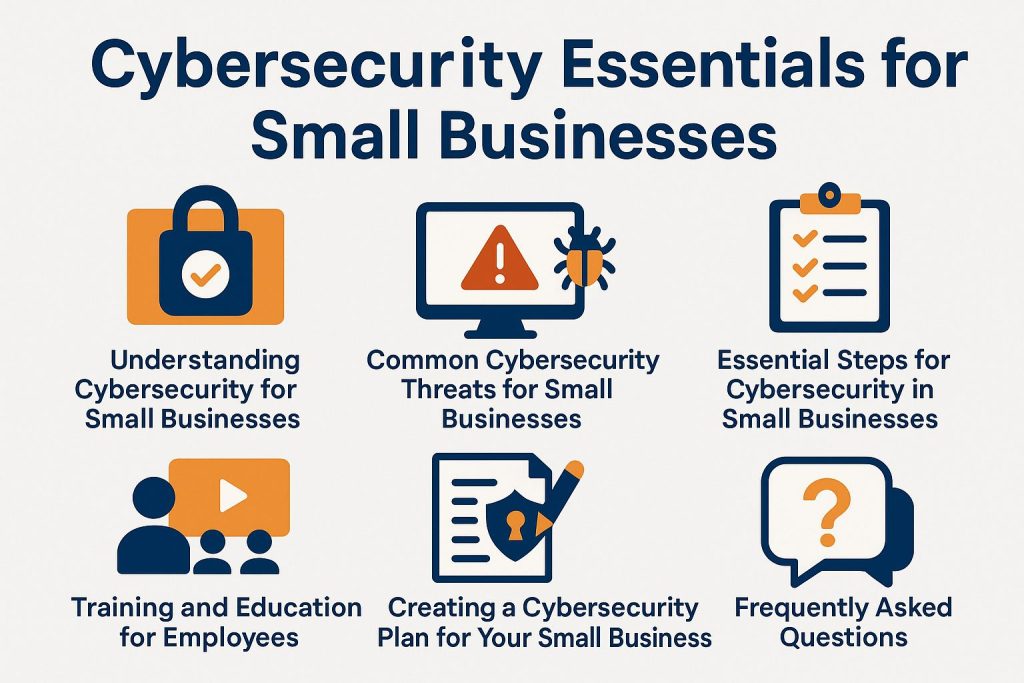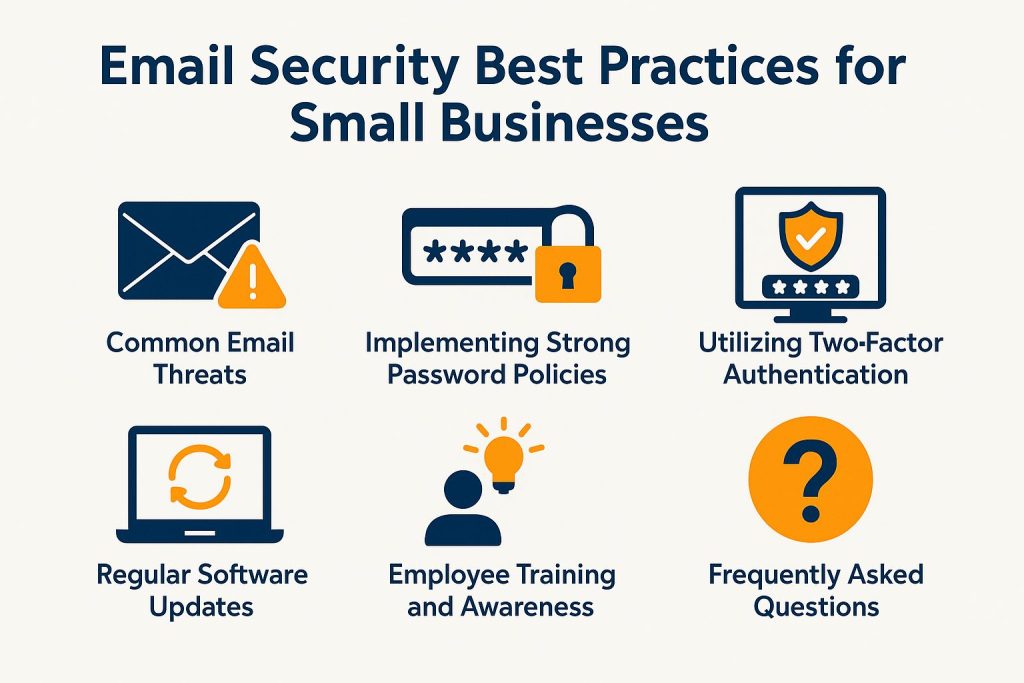Top Cybersecurity Threats Facing Small Businesses in Asheville

Cybersecurity is a critical concern for small businesses in Asheville. As businesses use more technology, they become targets for cyberattacks. This article reviews common cybersecurity threats, such as supply chain attacks, payment fraud, and web application vulnerabilities. It also outlines preventive measures and highlights the need for cybersecurity professionals.
Understanding these elements helps small business owners protect their assets and use cybersecurity solutions for sustainable growth.
Explanation of the Importance of Cybersecurity for Small Businesses
In today’s digital landscape, cybersecurity has become increasingly critical for small businesses, particularly in Asheville, where local cyber threats present unique challenges. These businesses often encounter various cyber threats, including ransomware, phishing attacks, and malware, which can lead to severe data breaches and significant financial losses.
Without strong cybersecurity, small businesses are vulnerable to identity theft, data loss, and digital threats. This can harm operations. Implementing effective cybersecurity strategies not only mitigates these risks but also enhances overall network security, ultimately contributing to the long-term sustainability of small businesses in a competitive marketplace.
The risks are not merely theoretical; many small businesses are subjected to these attacks regularly, leading to devastating consequences that can threaten their very existence. For example, ransomware can halt operations by encrypting data. Data breaches can expose sensitive customer information, leading to fines and lost trust.
This reality underscores the importance of cybersecurity awareness training for employees, equipping them with the knowledge to recognize and combat potential threats.
Following privacy laws helps businesses protect against cyber incidents and build client trust. A proactive approach to cybersecurity fosters resilience and encourages growth in an increasingly digital world.
Top Cybersecurity Threats Facing Small Businesses in Asheville
Small businesses in Asheville are vulnerable to cybersecurity threats that can harm their operations and finances.
Ransomware attacks have the potential to encrypt critical data, demanding substantial fees for decryption. Additionally, phishing scams can deceive unsuspecting employees into disclosing sensitive information. Malware can infiltrate systems, disrupting operations and leading to potential data breaches that compromise customer information.
Furthermore, insider threats and social engineering tactics are significant risks that often go unrecognized until it is too late. This shows the need for strong security protocols. DDoS attacks can also incapacitate online services, underscoring the necessity for robust cybersecurity measures that are specifically tailored to the unique threat landscape encountered by small businesses. For those interested in strengthening their defenses, learn more about network security strategies tailored for small businesses.
Overview of the Most Common Cybersecurity Threats and Attack Vectors
The landscape of cybersecurity threats is both diverse and continually evolving, highlighting the necessity for small businesses to remain vigilant about the common risks they encounter.
In the current digital environment, a thorough understanding of these threats, including attack vectors and endpoints, can distinguish between effective security measures and catastrophic losses. Ransomware attacks have surged, experiencing a reported 33% increase last year, particularly targeting the resources of small enterprises that often lack robust defensive strategies.
Phishing scams, responsible for nearly 80% of reported security incidents, manipulate unsuspecting employees into disclosing sensitive information such as passwords or financial data. Additionally, the repercussions of malware infections can lead to extended downtime and substantial recovery costs.
Data breaches expose organizations to regulatory fines and can result in significant declines in customer trust, while insider threats pose risks if current employees exploit their access for personal gain.
Moreover, social engineering tactics evolve. They exploit specific vulnerabilities in each organization. This highlights the need for awareness and training for all staff.
Preventing and Protecting Against Cybersecurity Threats

Small businesses must combat cybersecurity threats actively. They need to focus on prevention, protection, and ongoing training.
Implementing best practices, such as conducting regular vulnerability assessments, enables organizations to identify weaknesses in their IT infrastructure and fortify their defenses against potential attacks.
Investing in cybersecurity training helps employees recognize phishing attempts and other malicious activities. This builds a culture of awareness.
A strong incident response plan helps businesses react quickly to security incidents. This minimizes damage and protects digital assets.
For those curious about the strategic integration of cybersecurity measures, one of our most insightful case studies demonstrates this principle with real-world results.
A comprehensive risk management strategy is essential for small businesses. It should be tailored to their needs and include cybersecurity frameworks and cloud security.
Best Practices for Small Businesses in Asheville
Implementing best practices in cybersecurity is essential for small businesses in Asheville to protect themselves against the growing threat of cyberattacks. Businesses should create clear security policies. These should outline data protection, access control, and incident response protocols.
Utilizing cybersecurity tools, such as antivirus software, firewalls, and encryption, can significantly bolster a business’s defenses. Regular training on cyber hygiene and phishing empowers staff. They will learn to recognize and respond to potential threats. By fostering a culture of security awareness and adopting these practices, small businesses can enhance the protection of their digital assets and ensure operational continuity in the face of cyber threats. This approach aligns with the principles outlined in our analysis of how managed security services protect digital assets.
Along with these fundamental measures, small businesses should regularly update their software and systems. This helps reduce vulnerabilities that hackers often target. Emphasizing strong, multifactor authentication methods can reduce risks from unauthorized access.
Ultimately, these best practices strengthen cybersecurity. They also build client confidence about data confidentiality. With the appropriate cybersecurity tools in place, combined with ongoing employee training, businesses in Asheville can substantially decrease the likelihood of breaches while cultivating a proactive security environment.
The Role of Cybersecurity Professionals in Protecting Small Businesses
Cybersecurity professionals help businesses create and implement a strong cybersecurity strategy. This ensures compliance with regulations.
By developing and implementing a comprehensive cybersecurity strategy, these experts assist businesses in navigating the intricate landscape of IT security, ensuring adherence to relevant regulations. Regular security audits are conducted to identify vulnerabilities and establish effective risk management practices.
Moreover, cybersecurity professionals play a critical role in formulating incident response plans that facilitate a prompt and coordinated response to security breaches, thereby minimizing potential damage and enhancing business continuity. In particular, small businesses can benefit significantly from tailored IT solutions (our small business IT services provide strategies that ensure robust security measures are in place).
How Hiring a Cybersecurity Professional Can Benefit Small Businesses and Enhance Digital Security

Hiring a cybersecurity professional offers numerous advantages for small businesses, significantly enhancing their capacity to combat cyber threats and ensure business continuity. These experts possess specialized knowledge in threat intelligence and excel at implementing security frameworks tailored to the unique requirements of small enterprises.
Cybersecurity professionals identify vulnerabilities in an organization’s IT infrastructure. This includes network vulnerabilities and security gaps. They create strategies to strengthen cyber resilience and protect against attacks. Their expertise helps businesses prepare for incidents, minimizing disruptions and protecting operations.
For example, a small retail company faced data breaches that risked customer information. By hiring a cybersecurity expert, the business strengthened its defenses. This led to a 40% reduction in attempted breaches in the first year.
Another instance involves an e-commerce startup. They hired a cybersecurity professional to improve incident response. This helped them stop a ransomware attack before data was compromised.
These case studies show that working with cybersecurity professionals improves security and business resilience.
Frequently Asked Questions
What are the top cybersecurity threats facing small businesses in Asheville?
The top cybersecurity threats facing small businesses in Asheville include data breaches, phishing attacks, malware, ransomware, insider threats, and denial-of-service (DoS) attacks.
How can data breaches affect small businesses in Asheville?

Data breaches greatly impact small businesses in Asheville. They compromise sensitive information and cause financial losses, reputation damage, and legal issues. Cyber insurance can help reduce these impacts.
What is a phishing attack and how can it harm small businesses in Asheville, especially considering the current cybersecurity landscape?
A phishing attack is a cyber attack. Scammers use fake emails or messages to trick users. They aim to steal sensitive information or infect systems. These attacks can lead to financial losses and identity theft for small businesses in Asheville.
What is malware and how can it affect small businesses in Asheville, impacting their IT security?
Malware is malicious software that disrupts or damages computer systems. Good malware protection prevents infections in small business networks. This helps avoid data loss and security breaches.
How can small businesses in Asheville protect themselves against ransomware attacks with robust cyber defense strategies?
Small businesses can protect against ransomware attacks by backing up data regularly. They should use strong security measures, educate employees about threats, and keep software updated.
What are insider threats and how can small businesses in Asheville mitigate them through effective IT governance?
Insider threats are security risks from people inside the organization, like employees or contractors. Small businesses can reduce these risks with network monitoring and strict access controls. Educating employees about security best practices is also important.




